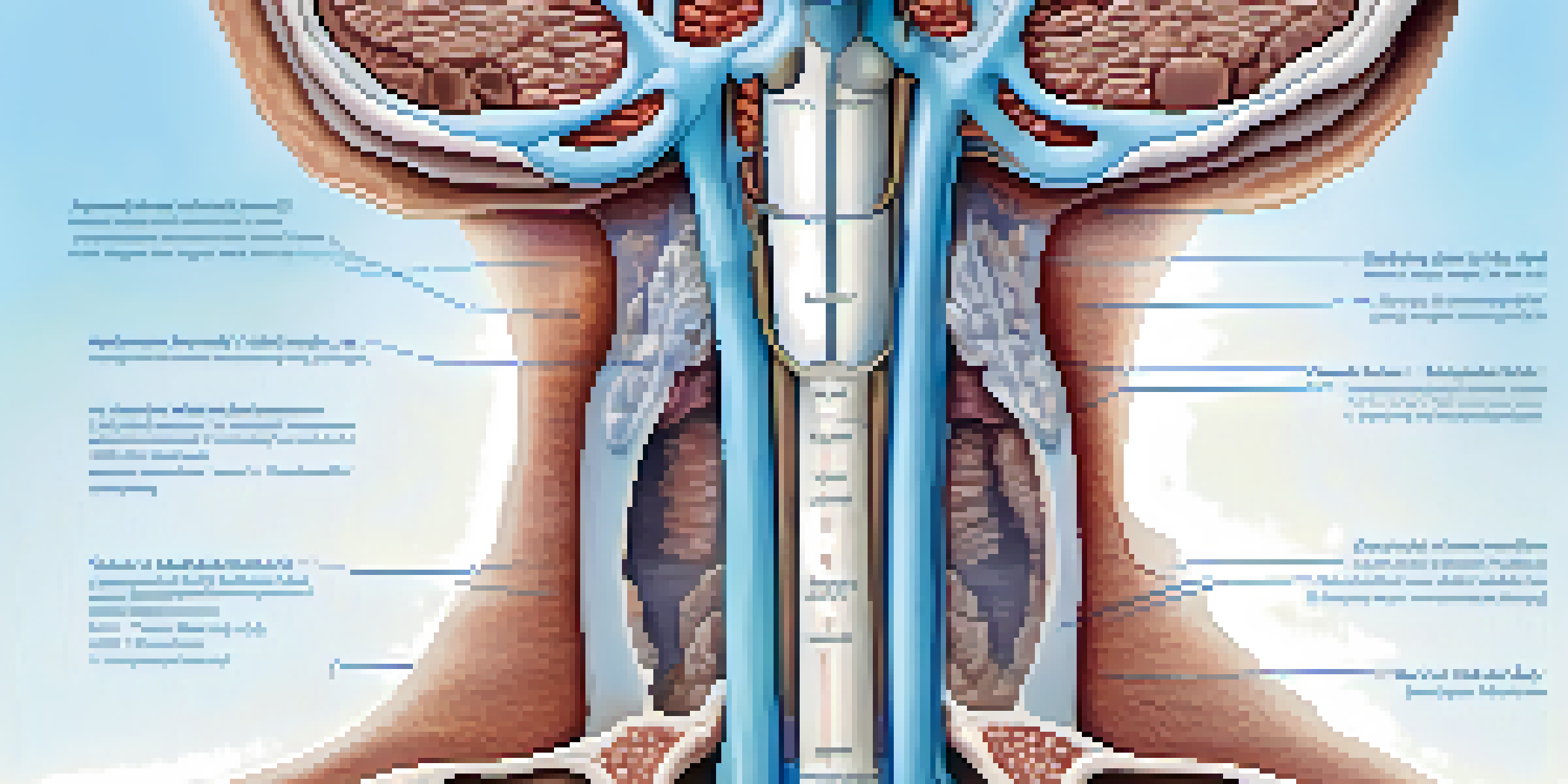The Thyroid Gland: Functions and Hormonal Regulation

What is the Thyroid Gland and Its Location?
The thyroid gland is a small, butterfly-shaped organ located at the base of your neck, just below the Adam's apple. Despite its size, it plays a huge role in your body's metabolism and overall health. Think of it as the body's thermostat, regulating energy use and affecting nearly every organ.
The thyroid gland is a master regulator of metabolism, controlling energy levels and weight management.
This gland produces hormones that influence various bodily functions, including heart rate and temperature control. Its position makes it easily accessible for examination, which is crucial for diagnosing thyroid conditions. The thyroid's health is vital, as it impacts everything from weight to mood.
Understanding where the thyroid is and what it does can help you appreciate its significance. Just like a conductor leads an orchestra, the thyroid coordinates many bodily functions through hormone secretion, making it an essential player in your overall well-being.
Key Functions of the Thyroid Gland
The primary function of the thyroid gland is to produce hormones, mainly thyroxine (T4) and triiodothyronine (T3). These hormones regulate metabolism, which is how your body converts food into energy. When your metabolism is functioning optimally, you feel energetic and alert.

Additionally, the thyroid influences growth and development, especially during childhood and adolescence. It also plays a role in maintaining healthy brain function and regulating heart rate. Imagine your metabolism as a car engine; the thyroid ensures it's running smoothly and efficiently.
Thyroid's Role in Metabolism
The thyroid gland produces hormones that regulate metabolism, impacting energy levels, weight management, and overall health.
Furthermore, the thyroid helps regulate body temperature, ensuring you stay comfortable in various environments. By controlling metabolic processes, it affects weight management, energy levels, and even mood stability, highlighting its crucial role in everyday life.
The Role of Thyroid Hormones in Metabolism
Thyroid hormones significantly impact your metabolism by determining how quickly your body uses energy and how it processes nutrients. When T3 and T4 levels are balanced, your body operates like a well-oiled machine, efficiently converting food into fuel. This balance is essential for maintaining a healthy weight and energy levels.
Balancing thyroid hormones is crucial for maintaining overall health and well-being.
An underactive thyroid, known as hypothyroidism, can slow down metabolism, leading to weight gain and fatigue. Conversely, an overactive thyroid, or hyperthyroidism, can speed up metabolism, resulting in weight loss and increased heart rate. It’s a delicate balancing act, much like tuning a musical instrument.
Understanding these hormonal effects can empower you to make informed lifestyle choices. For instance, if you're experiencing unexplained weight changes, it might be worth exploring your thyroid function, as it plays a pivotal role in regulating your body's energy expenditure.
Hormonal Regulation of the Thyroid Gland
The thyroid gland's activity is primarily regulated by two key hormones: Thyroid-Stimulating Hormone (TSH) and Thyroid-Releasing Hormone (TRH). TSH is produced by the pituitary gland and signals the thyroid to produce T3 and T4. When T3 and T4 levels are sufficient, they send feedback to the pituitary to reduce TSH production, creating a feedback loop.
TRH, on the other hand, is produced by the hypothalamus and stimulates the pituitary gland to release TSH. This intricate dance of hormones ensures that the thyroid operates within the necessary parameters. It's like a thermostat that adjusts the temperature based on the feedback it receives.
Importance of Hormonal Balance
Balanced levels of T3 and T4 hormones are crucial for maintaining a healthy metabolism, while imbalances can lead to various health issues.
This regulation is crucial because imbalances can lead to a range of health issues, from fatigue to heart problems. By understanding this hormonal regulation, you can better appreciate how delicate and interconnected our body systems are, emphasizing the importance of maintaining hormonal balance.
Common Thyroid Disorders and Their Symptoms
Thyroid disorders are relatively common and can manifest in various ways. Hypothyroidism, or an underactive thyroid, may lead to symptoms like fatigue, weight gain, and cold intolerance. On the flip side, hyperthyroidism can cause increased energy, weight loss, and heat intolerance, creating a stark contrast in experiences.
Another condition, Hashimoto's thyroiditis, is an autoimmune disorder that gradually destroys the thyroid, leading to hypothyroidism. Symptoms may include fatigue, weight gain, and depression. It’s crucial to recognize these signs early, as timely intervention can make a significant difference.
Regular check-ups and awareness of symptoms can help in early diagnosis and management of these conditions. Just as you would monitor your car for warning signs, staying alert to changes in your health can keep your thyroid functioning optimally.
How to Maintain a Healthy Thyroid
Maintaining a healthy thyroid involves a combination of diet, lifestyle, and regular check-ups. Consuming foods rich in iodine, selenium, and zinc can support thyroid health. These nutrients are essential for hormone production and can be found in fish, nuts, and dairy products.
Additionally, managing stress and getting regular exercise can significantly impact thyroid function. High stress can lead to hormonal imbalances, so incorporating relaxation techniques like yoga or meditation can be beneficial. It’s all about finding balance, similar to maintaining a healthy diet.
Maintaining Thyroid Health
A healthy thyroid can be supported through proper nutrition, stress management, and regular medical check-ups.
Don't forget the importance of regular medical check-ups, particularly if you have a family history of thyroid issues. Early detection is key to managing thyroid health effectively, ensuring your body runs as smoothly as possible.
The Future of Thyroid Health Research
Research into thyroid health is constantly evolving, with new discoveries shedding light on how this gland affects our overall health. Scientists are exploring the genetic factors that contribute to thyroid disorders, which could lead to more personalized treatments. Imagine a future where thyroid issues are managed with tailored therapies based on individual genetic profiles.
Additionally, ongoing studies are investigating the role of environmental factors and diet in thyroid health. Understanding how these elements interact with our biology could help prevent thyroid-related conditions. It's a bit like piecing together a puzzle, where every piece plays a role in the bigger picture.

As we gain more insights, the hope is to improve diagnosis and treatment options for those with thyroid conditions. Staying informed about these advancements can empower you to take charge of your health, ensuring that your thyroid remains balanced and functional.